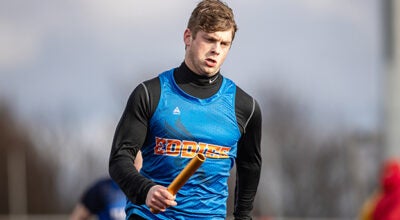Michigan finds out NCAA sanctions
Published 10:48 pm Thursday, November 4, 2010

Michigan coach Rich Rodriguez and the Wolverine football program found out its fate from the NCAA on Thursday. Michigan was given three years of probation. (The Daily News/Amelio Rodriguez)
The waiting and the guessing are finally over for the University of Michigan football program.
And while the news was generally good for the Wolverines, the fact still remains that it has been placed on NCAA probation for a major rules violation for the first time in school history.
The NCAA also sparred Michigan coach Rich Rodriguez, by changing the allegation that he failed to promote an atmosphere of compliance to a failure to monitor.
If college athletics’ governing body had not dropped that charge against the Wolverines’ coach, many felt he would be dismissed “for cause”, which would have allowed the university to fire him without having to pay the $4 million buyout clause in his contract.
The NCAA Division I Committee on Infractions released its findings Thursday afternoon and handed down its penalties to the program, which is college football’s all-time winningest.
The committee was looking into the allegations that Michigan exceeded playing and practice season limitations, exceeded limits on the number of coaches, a failure to monitor by the university and head football coach and unethical conduct by a former graduate assistant.
For those major rules violations, Michigan will have its practice times reduced and will be placed on three years probation.
“From the time the head football coach began working at the university in January 2008 through September 2009, the football program exceeded playing and practice limits by approximately 65 hours,” the report stated. “NCAA rules limiting athletically related activities are in place to safeguard student-athlete well-being while ensuring time for academic work. In this case, football staff members monitored and conducted voluntary summer workouts, conducted impermissible activities outside of the playing season, required student-athletes to participate in summer conditioning activities as a form of punishment, and exceeded time limits for athletic activities outside the playing season.”
The report went on to say “The committee noted that the violations of daily and weekly countable hour rules, though serious, were far less extensive than originally reported and that no student-athletes were substantially harmed.”
That finding probably kept the Wolverines from facing harsher penalties.
The committee also stated that the efforts of the compliance staff “were thorough and diligent.”
“However, the university failed to monitor when administrators withheld the job descriptions of the coaching staff and forms documenting the countable hours from the compliance office. The former director of athletics and senior associate director of athletics also did not insist the football staff immediately comply with the requests for the job descriptions,” the report said.
As a result, Michigan was placed on probation beginning Thursday and running through Nov. 3, 2013.
There will also be a reduction of 130 hours for “allowed countable athletically related activities hours in football from June 1 through the conclusion of the 2011-12 academic year,” which were self-imposed by Michigan.
Rodriguez must also attend the 2011 NCAA Regional Rules Seminar.
Michigan athletic director Dave Brandon said there were no surprises and that the university was “pleased to learn that the committee on infractions agreed with our position,” he said. “Before this failure to provide an atmosphere of compliance issue was dropped, I made it very clear that I did not feel that anything that had taken place here that should impact the status of our coach.”
Michigan admitted to all the charges laid out by the NCAA on Thursday with the exception of the Rodriguez charge. In August it traveled to Seattle and defended itself against that fifth charge against its coach.
It announced self-imposed sanctions in May, which the NCAA agreed with other than extending the probation by one year.
Michigan also fired Alex Herron, who also worked with Rodriguez at West Virginia. Herron was accused of lying to the NCAA during its investigation.
Brad Labadie, who was reprimanded along with others by the university, resigned as director of football operations earlier this year.
Brandon said there would be no appeals. He also said that none of the sanctions levied on Thursday were cause for dismissal of Rodriguez.
Among the members of the Committee on Infractions was Melissa Conboy, deputy director of athletics at the University of Notre Dame.






